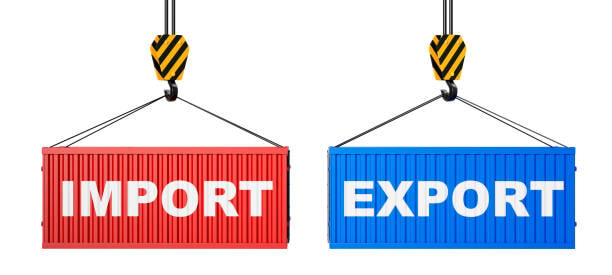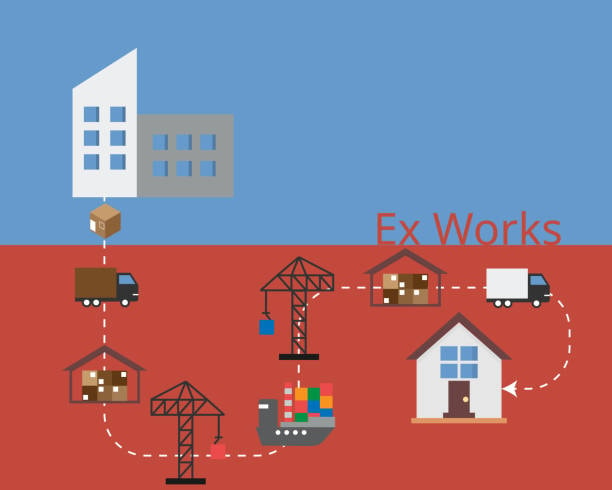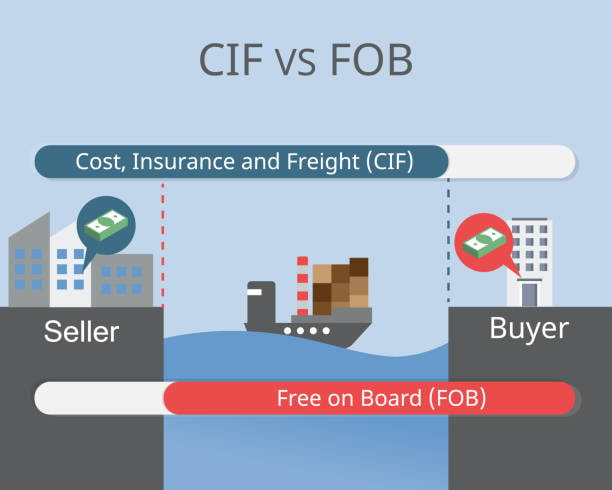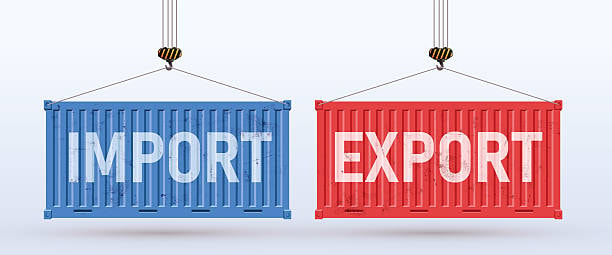
International trade requires complicated negotiations between purchasers and vendors and particular terms that characterise duties, expenses and hazards, including the shipping process . Among the most frequently applied Incoterms (International Commercial Terms), the following two – EX Works (EXW) and Free on Board (FOB) – can be regarded as basic shipping conditions, which any business operating on the international market has to be familiar with. These terms restrict who has the responsibility of dealing with transportation cost, insurance, custom clearance, and transferring shipping risk.

Background on GWT Worldwide: GWT Worldwide is a professional service provider of global logistics services with origins in international freight forwarding, supply chain services and cross-border e-commerce logistics. Having the experience of working with Pengangkutan Udara & Sea Freight, ChinaEurope Railway Transport, International Express & Courier Solutions, Customs Clearance & Warehousing and Amazon FBA Shipping & Labeling Support, we can fully support the shipping of your goods with safety, speed and on a compliant basis between our origin and destination.
What is EX Works (EXW) in International Trade?

EX Works is the lowest that sellers participating in international trade are binding to. In the EXW kind of delivery, the liability of the seller stops when he has availed the merchandise at his premises, factory or warehouse. The buyer takes up all responsibilities and risks involved in the transfer of the transportation of goods between the seller place to where the goods are finally delivered as well as loading, export customs clearance of the product, international transportation, importation duties and the delivery of the goods to their facility.

This structure imposes the most on the buyer who has the responsibility of organizing the entire logistics chain which runs through the pickup and delivery. The seller will merely make the goods ready to pick up and give the required paperwork to make the buyer transport the goods. Sellers who need to keep their part in the delivery process to a minimum, and shift as much of the responsibility as possible to the buyer prefer to use EXW.
Understanding FOB (Free on Board) Terms
Free on Board is an indicator that the responsibility lies upon the seller to the goods until the time they have been loaded into the ship at the shipping port. In FOB term, the seller clears the export customs, cost of shipping to the port and loading costs. As soon as the goods pass the rail of the ship at the assigned port, the risk shifts to the buyer and he has to be in charge of pengangkutan laut, ocean insurance, custom import procedures, and payment of import duties, as well as delivery.
The FOB terms will bring more equitable allocation of roles over EXW terms, where the first concerns the logistics in the origin and the second concerns the transportation across the borders and the import procedures. This arrangement is mostly used in Sea freight cargo and sets proper definition of roles at the port of loading, thereby impacting shipping costs .
Key Differences Between EX Works and FOB
The essential difference between the EXW and FOB is the point of risk transfer and boundaries of seller responsibilities. In the case of EXW, risk passes once goods are available at the premises of sellers, whereas risk passes when goods are loaded to the vessel on the port of shipment when the case is of FOB. This distinction has a great influence on the cost distribution, insurance needs, export procedures and logistics arrangement among parties.
Under EXW, it is the responsibility of the buyer to make all arrangements concerned with transportation of the goods after their departure point in the country of the seller, both home transportation to the home of the seller as well as the exports and international shipping. FOB sellers are responsible of domestic transportation, export requirements, and they deliver goods that are ready to be transported to overseas countries. When making the decision to use these terms, the ability of the buyer in terms of its logistics capabilities and desire to be in control of the supply chain usually comes in.
Cost Implications of EXW vs FOB
There is a huge difference in the cost structures in the EXW and FOB arrangements. The sellers will tend to quote low prices on their products as EXW does not include any transportation and logistics cost. Nevertheless, it costs more to the buyers considering the pickup, domestic transportation, exportation procedures, transport costs and foreign shipping. The visible cost saving advantage of EXW can be diffused with lack of locality and bargaining power of the buyers in the country of the seller.
FOB prices normally contain the domestic transport cost, the cost of exportation and thus may make the quoted prices higher, but the total costs less exasperating to the buyer. The domestic shipment and exportation processes tend to cost sellers less since they are located locally and have connections with the people who can provide the service. This may lead to cost saving in the transaction as the total costs may be lower esp. to the transactions even though the quoted prices may be higher.
Risk Management in EXW and FOB Terms
Risk management measures differ so much between FOB and EXW terms. ExW puts the most of the risks on buyers once leaving the sellers premises, which makes it necessary to secure extensive insurance and means choosing the most responsible logistics services providers. The buyers have to evaluate the risks related to internal carriers, export clearance exportation, and international shipping along with coordinating the activities of various service providers.
FOB entails more balanced distribution of risks, where duties of risks are on seller until the goods are loaded in the ship. Such a set up exposes less of the buyer to the risks of transporting goods domestically and the complexity of export processes in a country of the seller. Nonetheless, there are still considerable risks associated on both ocean freight and import operations to buyers, who in turn need a proper insurance cover and good logistic stakeholders.
Export and Import Responsibilities
Under the EXW, all export requirements are left to the buyer who has to deal with the customs procedures and documentation of the country of origins as well as the act of exporting. This may be difficult to the buyers who are not conversant with the law in the country of the seller and may cause delays or the failure to comply with them. Buyers should also fill adequate Export documentation of their own country in imports.
FOB terms place exporting duties on the seller who undertakes the tasks of customs clearance, export documents and meeting local requirements. This is because this arrangement will utilize the local knowledge and contacts of the seller with customs broker and freight forwarder. With both terms the responsibility of importing duties rests on the buyer and hence he/she should have the understanding of laws, export licenses, and processes governing the destination country.
Documentation Requirements for Each Term
The documented requirements between the EXW and the FOB terms differ according to the responsibilities of the parties involved. All shipping information needed by the EXW buyer such as commercial invoices, the packing list, the export license, and certificates of origin, and transport documentations are an issue in the hands of the buyer. This needs knowledge of the requirements of the origin country and destination country and the need to coordinate with several service providers.
Sellers of FOB do the export documentations and the buyer does the import procedures. Sellers fill commercial invoices, packing lists, export declarations and bills of ladings when using the ocean mode of transport. The buyers get duly documented deliveries and concentrate on import custom clearance, payments, and delivery on domestic levels. Effective communication between the parties guarantees the flow of documentation, compliance, and proper shipping arrangement.
Insurance Considerations
There is a great difference between insurance when using either of the EXW and FOB arrangement. EXW buyers require full insurance coverage between what the seller can deliver on or near his premises to destination including consignment departmental, ocean and even storage. That entails knowledge in the different types of insurance and the multiple modes of transportation as well as jurisdiction.
Generally, under FOB arrangements, the buyer is supposed to obtain insurance at the port of shipment to the point of destination. Although this narrows down the coverage that has to be made as compared to EXW, there is still the need to make proper marine insurance in order to cover its transit across the ocean, and possibly cover domestic delivery. Under FOB terms sellers can opt to await insurance in domestic transportation and in handling at the ports.
Choosing Between EXW and FOB for Your Business
The use of either EXW or FOB is decided by many factors such as logistic expertise, costs, risk tolerance and the preferences of control. Firms with good international logistical capacity and long-standing relationships with freight forwarders might want to use EXW, an international trade term, so that it could have full control of the supply chain and possibly lower its costs, as a result of negotiated terms.
The use of FOB terms is usually beneficial to businesses that have no experience in international logistics or businesses that want to keep operations as simple as possible. This business model gives the sellers an opportunity to use their local knowledge and connections and simultaneously gives the buyers products to be shipped to other regions. Not only quoted prices alone should govern the decision, but the total landed costs, and the exposure to risk, as well as, operational capability should be considered also.
Kesilapan Biasa yang Perlu Dielakkan
There are a number of errors typically made in the transactions concerning the use of EXW and FOB. One of the tactics is when buyers fail to realize the logistic hassles of EXW and end up pricing cheaply in a bid to quote the lowest price ignoring the total landed costs. Poor insurance cover is also another common mistake that exposes parties to big losses due to inadequate insurance.
Miscommunication between the buyers and sellers and lack of communication on documentation requirements, schedule of pick-up and port procedures may cause time wastage and extra expenses. Lack of knowledge of local regulations and customs requirements with the origin countries may result in export delay and noncompliance. Effective planning, coordination, and logistics consultants can reduce the following pitfalls, especially when understanding transportation procedures .
Impact on Supply Chain Management
The terms of EXW and FOBs have a great influence on the supply chain management and efficiency approach. EXW allows the highest level of control over supply chain, yet it relies on a big level of logistic skills and resources. Organizations that adopt the EXW mode have to build capacities of global transportation, customs clearance, and risks mitigation in various countries as a trade term .
Under FOB, the seller and needy have a more cooperative relationship in its supply chain, as the responsibilities of logistics gets shared. This is capable of increasing efficiency with expertise as well as putting less load of work in the hands of a buyer. Nevertheless, it needs organized actions among the parties and effective communication on the timetables, written information, and quality expectations seller’s premises.
Legal and Compliance Aspects
The use of the EXW or FOB terms about the prices of goods or products have legal implications which go beyond the basic cost and risk allocations. These terms influence construction of contracts, out-of-court settlement and regulation adherence. EXW buyers take additional risk of ensuring that they comply with export regulations in the country where the seller operates in; they must also consider the logistics to reach the final destination. otherwise, they may face legal problems in the event of breaching the regulations buyer assumes responsibility seller makes.
FOB arrangements mean that, under this arrangement, the seller takes responsibility in terms of export compliance as it is the responsibility of the seller to ensure compliance with both the local and international trade regulations transportation costs. Both of these terms should be taken seriously in terms of regulations of locations to which imports are sent and regulations of compliance. The complexities of the regulatory environment should be negotiated through professional legal guidance as well as the help of tried and tested freight forwarders to avoid any legal wrangle.
Technology and Digital Solutions
The contemporary technological applications promote the efficiency of the management of both of theEXW and FOB marketing in terms of enhanced visibility, communication, and documentation. The online-based tools allow tracking in real time, automatic record keeping, and efficient communication between the parties. These tools are useful to EXW buyers dealing with multi-leg shipments that have more than one service provider.
The integration of systems included in FOB transactions provides the advantage in which the local operations of a seller and the foreign logistic network of a buyer interlink. Digital solutions promote smooth circulation of the information, host fewer errors in documentation, and enhance the coordination of parties. Both the EXW and FOB arrangements can be highly efficient as well as cut down on cost through investment in proper technology platforms.
Regional Considerations and Variations
The application of these terms, EXW and FOB, are affected by practices and regulations of regional trade. These terms also have certain requirements or restrictions which apply in some countries depending on how they will be implemented practically. It is necessary to learn about local business practices, regulations, and infrastructure capabilities when engaging in international trade because they are required to conduct a business successfully.
Business culture and communication culture may also play an important role in determining the success of EXW and FOB terms. It will be easier to build some relationships with partners standings in the region and understand what trade terms are prefered in the region, which will enhance efficiency of the transactions and will help in eliminating misunderstandings. Adaptability and intercultural sensitivity are elements leading to effective international trade relations.
Future Trends in International Trade Terms
Evolution of international trade still has its effects on the application and interpretation of the terms, EXW and FOB. The implication of digital transformation, sustainable needs, and the shifting regulatory regimes are redefining the implementation of these terms in various forms. The increase in e-commerce also is leading to a need in more adaptable and dynamic logistics options.
The Environmental factors are playing a growing role in the choice of trading terms, as businesses attempt to maximize the efficiency of their transport activity and minimize carbon impact. International trade transactions that involve transparency and efficiency are being enhanced using emerging technologies such as block chain and artificial intelligence. The trends will keep on affecting the application of terms of the EXW and FOB in international trade delivered duty paid.
Best Practices for Implementation
Effective application of the EXW and FOB terms involve careful planning, effective communication and use of the right partners. Defining the specific contracts, setting the responsibility, dates, and the level of performance will also help to avoid the confrontation and guarantee the successful functioning. Frequent interaction between the parties in the course of the transaction process detects and solves any problems that might arise before they turn out to be a problem.
In both the EXW and the FOB instances, it is essential to choose competent and dependable partners in the fields of logistics. The partners were expected to have had experience in the pertinent trade lanes, performance track records as well as proper insurance cover. Establishing long term relationship with trusted service providers enhances consistency and minimises transaction costs with time designated location all the seller.
Kesimpulan
EX Works and FOB are the two most basic models of international trade, each one of which has its benefits and limitations. EXW is the most flexible and most controllable mode of transport by buyers with sufficient logistics capacities, and FOB is the balanced solution applicable to companies that prefer to share parts of various responsibilities with competent sellers. Decisions to accept the terms of one of these terms must be conducted through thorough examination of cost, risks, capabilities and strategic goals as opposed to comparing the prices quoted by the firms. In order to be successful with either of the terms, one needs to plan, communicate well, have partners with experience, and use adequate risk management plans.


Thank you for reading!
Have questions, corrections, or better ideas? We’d love to hear from you!
We value every piece of feedback and promise to reply within 24 hours. Let's make this guide better together!
Note: Spam comments will not be published.